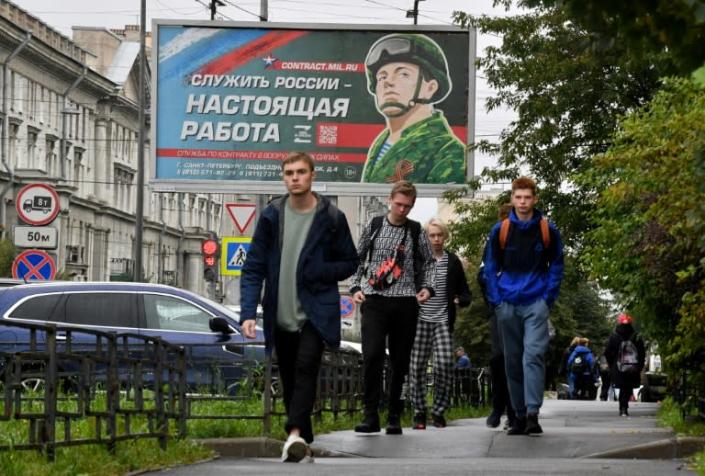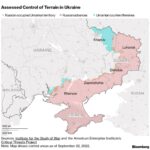
Russia will annex four regions of Ukraine that its troops occupy at a grand ceremony in the Kremlin on Friday, Moscow said, after President Vladimir Putin threatened he could use nuclear weapons to defend the territories.
The threats have not deterred a sweeping Ukrainian counter-offensive, which has been pushing back Russian troops in the east and is on the doorstep of the Donetsk region town of Lyman that Moscow’s forces pummelled for weeks before capturing this summer.
Kremlin spokesman Dmitry Peskov told reporters that the annexation of these four areas would be formalised at a ceremony in the Kremlin and that Putin would deliver a “major” speech.
The Russian leader himself then blamed the conflict in Ukraine on the West and said simmering conflicts in the ex-USSR were the result of the Soviet collapse.
The rhetoric built on his now famous phrase that the collapse of the USSR was a tragedy and he has recently suggested Moscow should extend again its influence over the former Soviet region.
“It’s enough to look at what’s happening now between Russia and Ukraine and what is happening on the borders of some other CIS countries,” Putin told security chiefs from former Soviet countries.
– ‘Soviet collapse’ –
“All this, of course, is the result of the collapse of the Soviet Union,” he said.
The Kremlin-installed leaders of the four regions that pleaded to Putin for annexation this week were gathered in the Russian capital Thursday ahead of the ceremony.
Their nearly simultaneous requests came after they claimed residents had unanimously backed the move in hastily organised referendums that were dismissed by Kyiv and the West as illegal, fraudulent and void.


Ukraine after the so-called referendums said the only appropriate response from the West was to hit Russia with more sanctions and to supply Ukrainian forces with more weapons to keep reclaiming territory.
“Ukraine cannot and will not tolerate any attempts by Russia to seize any part of our land,” President Volodymyr Zelensky said.
The Ukrainian leader on Thursday called an “urgent” meeting of his national security council on Friday, his spokesman said, after the Kremlin announced the timing of the annexation ceremony.
The four territories — Kherson and Zaporizhzhia in the south; Donetsk and Lugansk in the east — create a crucial land corridor between Russia and the Crimean peninsula, annexed by Moscow in 2014.
Together, all five make up around 20 percent of Ukraine, whose forces in recent weeks have been clawing back ground.
In the south, Ukrainian forces have been wresting back territory near Kherson and residents of recently recaptured villages described to AFP journalists this week months of terror under Russian occupation.
“They robbed and humiliated us,” 72-year-old Maria Syzhuk said in the village of Vysokopillya, echoing with the dull thuds of artillery from both sides — mostly in the distance, but sometimes a little too close.


Kyiv’s army in particular has been progressing in the eastern Kharkiv region and recapturing territory in Donetsk. Military observers say Kyiv’s forces are close to capturing Lyman.
“At the moment, our units are managing to repel all attacks,” a Russian-backed official in the Donetsk region, Alexei Nikonorov, told state TV on Thursday.
– ‘I don’t want to kill people’ –
Moscow’s forces are striking back along the entire frontline and officials in Kyiv said Thursday that Russian bombardment had killed three in the Dnipropetrovsk region, five in Donetsk and wounded seven in the Kharkiv region.
Along with threats to use nuclear weapons, Putin announced a mobilisation of hundreds of thousands of Russian men to bolster Moscow’s army in Ukraine, sparking demonstrations and an exodus of men abroad.
Finland’s Vaalimaa crossing has been flooded with new arrivals recently and has grown more precarious after Helsinki announced it would close its border from midnight to Russians holding European tourism visas for the Schengen zone.
“I just made it through, I don’t know how the others will get through. It’s sad, sad,” Andrei Stepanov, a 49-year-old Russian, told AFP of Finland’s new restrictions.
On a bright morning in Mongolia’s capital Ulaanbaatar, a young Russian fleeing Moscow’s first military call-up since World War II had a stark answer for why he had left: “I don’t want to kill people.”
“It was very difficult to leave everything behind — home, motherland, my relatives — but it’s better than killing people,” the man in his 20s told AFP, speaking on condition of anonymity.
Russia’s move to annex the Ukrainian territories was met with the announcement from the United States of a new package of weapons and supplies worth $1.1 billion, including precision rocket systems, ammunition, armoured vehicles and radars.
And the European Commission proposed fresh sanctions targeting Russian exports worth seven billion euros, an oil price cap, an expanded travel blacklist and asset freezes.
bur/imm




